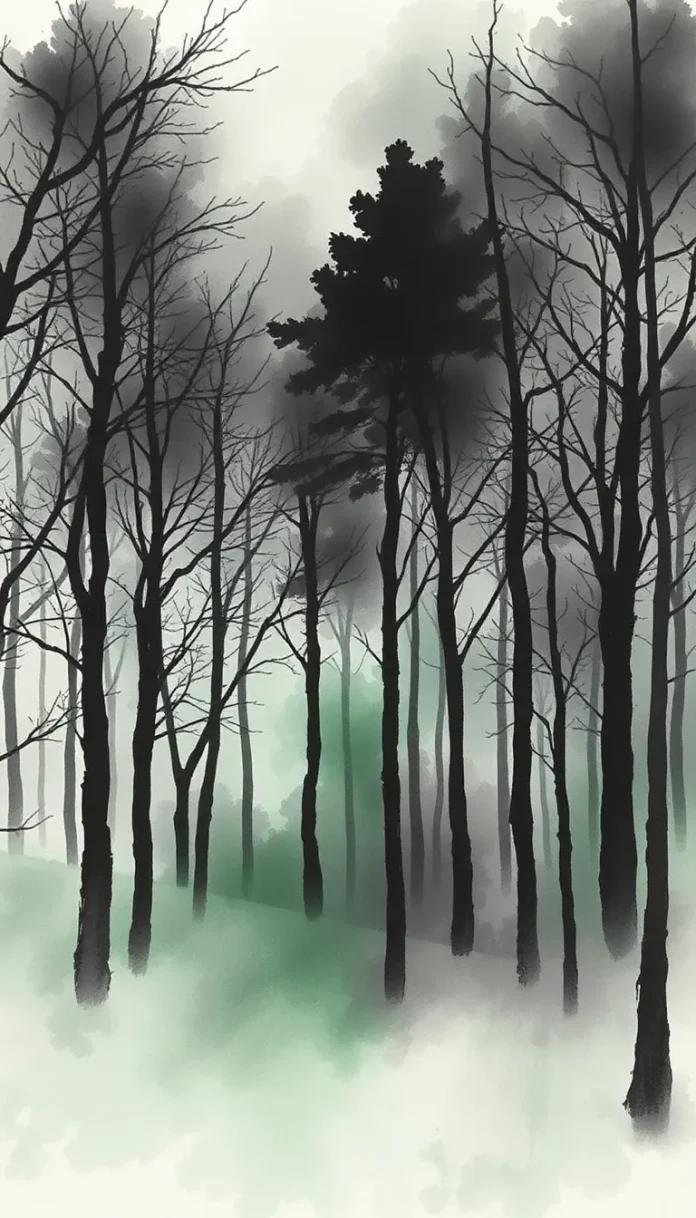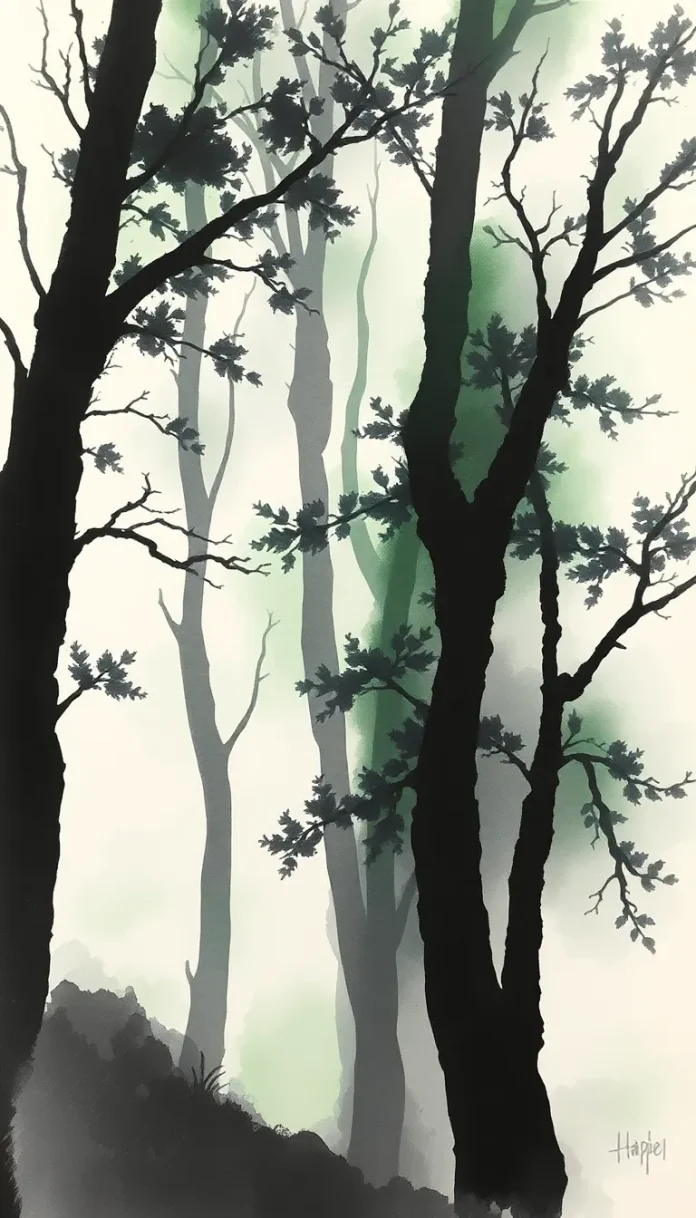The Soliloquy of Stones
A traveler treads the path of thorns, his shadow gaunt, unbent—
Toward the specter of a fortress, clawing at the bruised horizon’s breast,
Its turrets skeletal, its moat a grave where whispers coalesce.
No banner flutters in the gelid wind; no torch betrays a host.
The portcullis, a rusted maw, hangs slack as some forgotten ghost.
He enters, boots alighting on the flagstones’ blighted skin,
Each step a dirge for grandeur lost, for rot that seeps within.
The hall extends—a ribcage stripped of flesh, of breath, of song—
Where tapestries, now moth-ensnared, once blazed with battles long.
A mantle weeps its marble tears above the hearth’s cold womb,
And through the fissures in the walls, the ivy threads its loom.
A staircase spirals, serpentine, into the tower’s throat.
He climbs, as men climb toward their doom, with dread as thick as mote.
A chamber yawns—a desk of oak, a chair enrobed in dust,
A parchment clenched beneath a vase where roses once knew trust.
The seal, a smudge of crimson grief, surrenders to his thumb.
The script unfolds in iron gall, a voice long rendered numb:
*“To whom the wind may guide herein, when I am ash and air—
Should you be kin to sorrow’s tune, pause, stranger, pause and bear
The chronicle of him who dwelt where now the spiders reign,
Who courted solitude as bride, then cursed her as his bane.
Three decades past, these stones rang bright with lute and clinking gold,
For I was lord of all you see, yet slave to wants untold.
But grandeur’s wine turns sour swift; each friend a flickering shade.
They fled the plague, the siege, the frost—or debts my coffers made.
One eve, as winter’s tongue licked clean the marrow of the land,
A figure came—a minstrel veiled—with eyes too vast to stand.
She sang not of the spring’s first kiss, nor battles bravely won,
But of the void between the stars, the silence of the sun.
Her ballad carved a hollow where my heart had hammered loud,
And when she left (as all must leave), she took my pulse as shroud.
I burned the tapestries, one by one, to feed my newfound creed,
Dismissed the servants, barred the gates, and let the gardens bleed.
Years gnawed the walls. The rats grew bold, their eyes like judgment’s beads.
I dined on memory’s bitter rind and sowed the floor with weeds.
Yet still I wrote her letters—reams!—though none could name her home.
They piled high as fallen leaves, these orphans of the loam.
Last night, the frost—it kissed the glass with lips of crystal scorn,
And in the pane, I saw her face, though she was never born.
Her hands pressed cold against my own; her voice, a silver knife:
‘You chose the labyrinth, dear fool—now make it your long life.’
I write this final page by light that leaches from my bones.
The quill now trembles… ink runs thin… O, how the wind intones!
If you have loved what cannot stay, or nursed a ghost to breast,
Then break this desk to kindling, and let the stones find rest.”*
The traveler sits, the letter pressed against his ribs’ tight cage,
As twilight bleeds through leaden panes to stain the voiceless page.
Outside, the crows convene their court in branches black and bare.
He laughs—a sound like splintered ice—and breathes the thickening air.
For in the script, he tastes his youth: a sweetheart’s vanished wave,
A mother’s voice dissolved to smoke, a brother in his grave.
The castle’s sigh becomes his own; its ruins, his estate.
He dips the dead lord’s quill in ash, begins to annotate:
*“I too have fed on solitude’s meagre feast, her brackish wine,
And raised my towers in the deep where no allied stars may shine.
This missive, brother, bridges time—two fools in mirrored glass—
Yet I’ll not burn your prison down. No. I shall let it pass
To those who next seek refuge here when we are phantom-thin,
That they may add their silent verse to this old, gaping hymn.”*
He folds the page, returns it to the dust’s embrace, and turns
To face the stair’s descent—but something in the darkness yearns.
A shape—or trick of shadow’s tongue?—a woman’s trailing gown?
The minstrel’s song coils through the stones, a vine without a crown.
He follows, pulse a frantic moth, through corridors that twist,
Past portraits where the varnish screams, through doors of amethyst.
The tower’s peak: a room of clocks, their hands all torn away,
And there, upon the windowsill, a single rose decays.
Its petals hold the hue of veins, of sunsets drowned in tea,
And as he lifts it, thorns bite deep—a welcome agony.
The moon ascends, a pallid judge. The rose crumbles to soot.
Below, the courtyard chants his name with tongues of bramble-brut.
He leaps—not toward death, but to clasp the phantom’s fleeting hem,
And in that flight, he grasps the truth: *She is not here. She’s them.*
The stones receive him tenderly, their moss a cushion sweet.
The crows alight, their beaks adept at secrets they’ll repeat.
Centuries hence, a girl will tread this path with heart askew,
Find two letters fused by time, and weep as I weep now—
For solitude, that siren vast, who sings us to her shore,
Then grinds our bones to make her bricks, and always hungers more.


